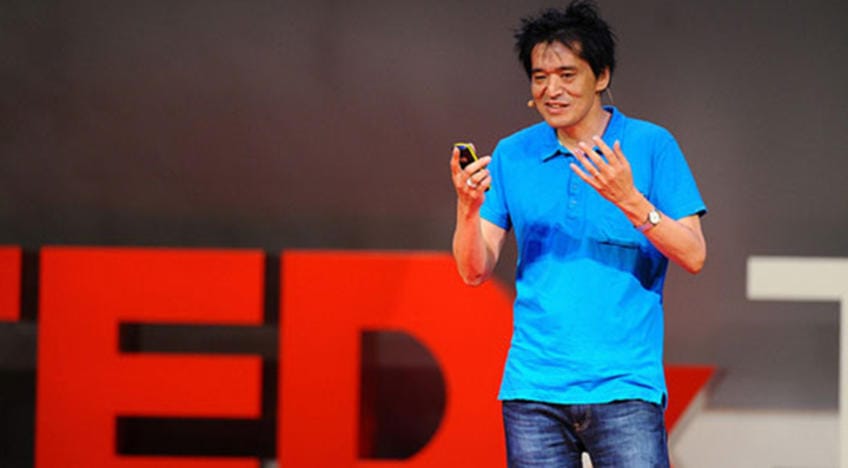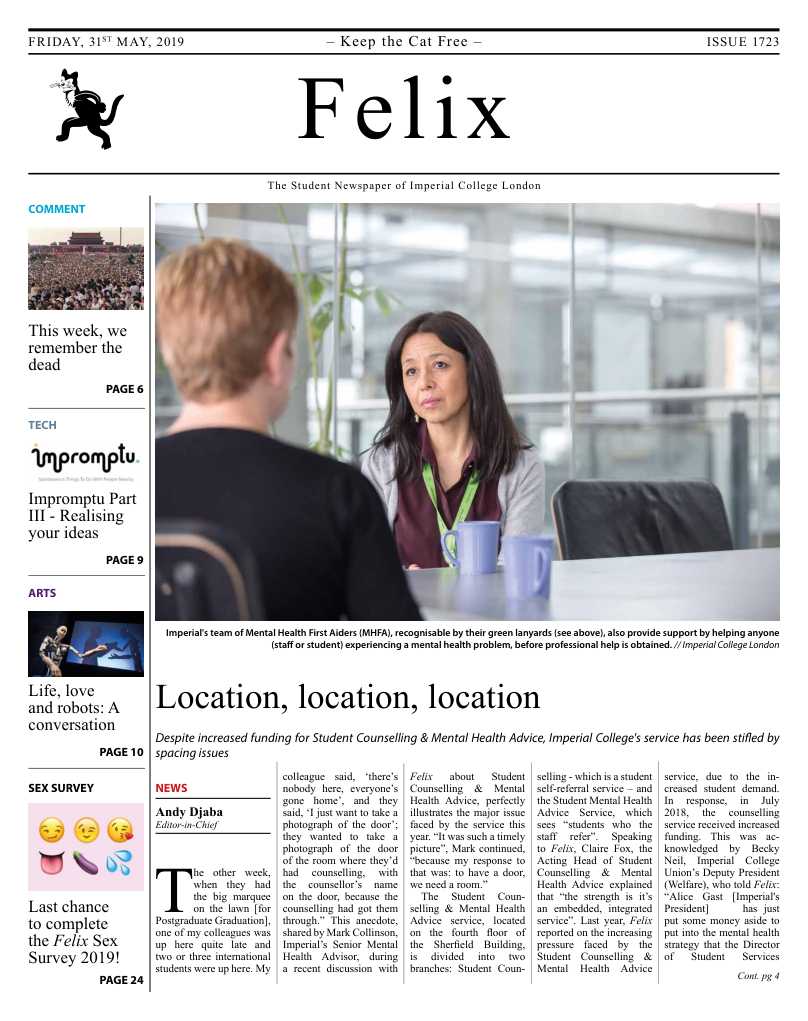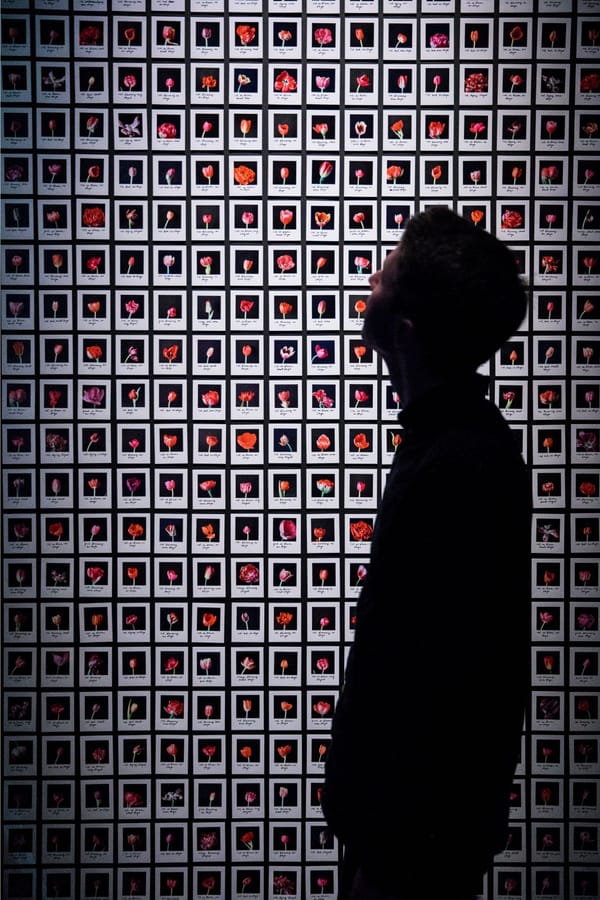Life, Love and Robots: A Conversation
Following on from last week’s feature on AI: More Than Human, Arts Writer Amanda interviews the father of the exhibition’s humanoid robot: Alter 3.

The exhibition ‘AI: More Than Human’ (explored in the previous issue of Felix) is taking place at the Barbican right now, where visitors can explore the topic of artificial intelligence and machine learning, spanning back to the Middle Ages, then jumping to 1940’s Alan Turing to today’s newest gimmicks in the field. In my eyes, the exhibition gives rise to more questions than it does answers. In an attempt to answer some of these questions, I spoke to Takashi Ikegami, professor at the University of Tokyo and one of the main (human) brains behind Alter 3.
Hi Takashi! Your background is a doctorate in Physics, and today you have your own AI lab in Tokyo, Japan. How come your career took this turn, were you always interested in AI?
Basically, I am interested in what life is. People, or even physicists like Schrödinger, the father of quantum mechanics, want to know why some matter becomes life, and some matter doesn’t, and what the distinction between the two is. Then came the personal computer back in the 80’s, and now everybody has a computer. There’s still so many things to discover, and that’s how I started doing systems studies. We didn’t call it AI, we call it “A(rtifical) Life”, life comes first, intelligence might come as a by-product or a side effect.
What would you define as life?
Well it’s a difficult question, but humans are the ones who decide what is and isn’t life. We came up with the Turing test. The Turing test is a more language based distinction between human and non-human. You interact with an android and judge how human-like they are. It’s based on a lot more than just appearance, but once you think you could be in love with her/him, and you don’t care whether it’s a machine or not, that’s when we’ve reached the goal.
Would you say there is artificial intelligence that meets this standard already?
Well, people don’t really know what artificial intelligence is. Already, computers can calculate much faster than humans, but people shouldn’t call it AI. It’s difficult because people call what is essentially just machine learning AI. So we’re not at that level yet.
Do you think we’ll know when we get there?
Hopefully. But I’m not sure. Like I said, on some level people don’t care what something is made out of, whether it’s a computer programme or not. When you become friends with someone, you don’t just suddenly stop liking them or stop being friends with them because they consist of a programme. That’s why artificial life is more important than artificial intelligence. Artificial life is more about how you can interact with the mind, if there is such a thing as the mind. Mind can emerge on top of computational processes and chemical processes.
You are part of the team that created Alter 3, which can be seen here at the Barbican right now as part of the “AI: More than Human” exhibition. Would you describe that as life?
We don’t call it life, but we do think it is a different type of robot. It’s an alternative robot in the sense that it is not based on the task, it’s not based on computational functions, instead it is based on artificial life principles. Alter 3 has been given the basic task to mimic a human being. If a person steps up in front of Alter 3, he will try to mimic the person, but also to consult his memory of behaviours to try and pick up and match the human in front of him. He will try to retrieve past behaviours from his memory.
So Alter 3 shows machine learning?
Alter 3 shows machine learning, yes, but the basic processes behind it we call Darwinian evolution, picking up one pose and making a variation of it, attached to the memory. So a memory organisation is built. The personality of Alter 3 arises from these complex memory-tree structures.

Do you feel like you have a personal relationship with Alter 3?
Yeah, I do think so. The more time you spend with Alter, the more you start to like him. I feel like I want to know more about him.
Takashi, you are obviously a scientist, but do you consider yourself an artist as well?
Yeah I consider myself an artist after 5 pm. When you conduct scientific research, you have to produce papers for journals, and that’s what everything revolves around. However, there’s a lot of things you can’t show through simple figures and numbers. Art is a totally different way to present these ideas to people, and can be easily understood.
In your work you’ve stated the theory that the mind emerges from mass flow of data. Would you say this school of thought makes you different from other researchers in the field that might take a more reductionist approach?
Yeah, usually people think life emerges from neural networks. One of my theories is based on the work of artist Nam June Paik. Usually you build a robot in a laboratory-setting and you experiment on it there. But Paik took the robot to the city. And in the city the robot was hit by a car, and then became the first robot to ever have been involved in a traffic accident. The world is so messy, so complex, and that’s the challenge you’re really facing in all of this. I think the difference between Alter 3 and other robots has to do with its complex environment. Autonomy is not performing random acts regardless of what’s going on in the environment, life-like autonomy is interacting with your environment. The mind is not encapsulated in the body, the mind is constantly interacting with the environment. Alter 3 is not trying to stop the massive data flow, instead to receive it all and be more adaptive towards it.
Where do you see artificial intelligence going in the next decade?
The market needs more robot-to-robot interaction. It might be interesting for creating a new kind of mathematics. I always think of the human as a bottleneck. With big data, AI don’t need to visualise and write down equations like we do. They just go from big data to big data, bypassing the rest. They can therefore create their own mathematics and own languages. How we understand things is different from how AI understands things, so we need better translation between these two.
After talking to Ikegami I’m left pondering about AI and the definition of life. Could the future really contain some sort of Ex Machina-style androids for us to fall in love with? Will a version of Alter 3 one day be someone I come home to find on the couch, eating Ben & Jerry’s and watching Love Island? I can’t help but view Takashi Ikegami as a bit of a Victor Frankenstein, perhaps a misunderstood genius, but so devoted to his craft of creating life that this might not be the last we hear from him.








